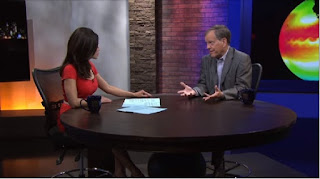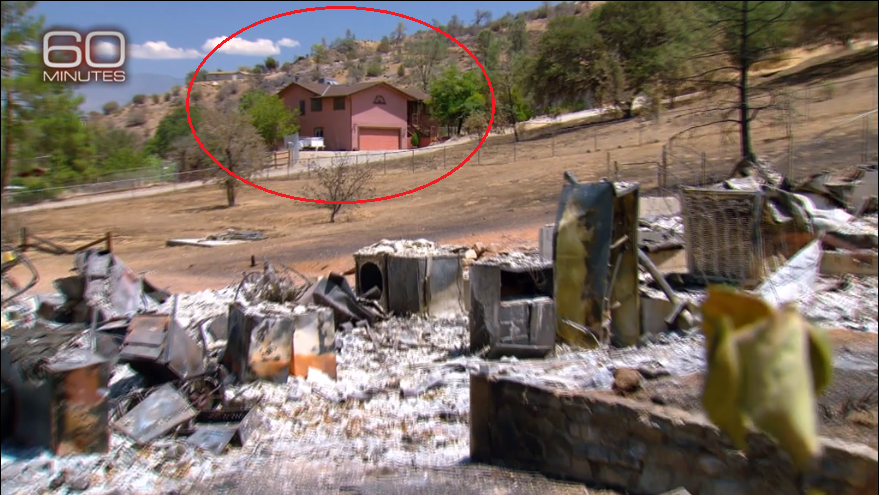Texas, Oklahoma, Show BIGGEST CO2 Reductions, Sierra Club's Pope Says
Sierra Club's former president says in a new book that Texas and Oaklahoma have reduced their carbon footprints more than other U.S. states because they've transferred so much of their power generation to wind turbines and natural gas.
 Former Sierra Club President Carl Pope, in town promoting a new book "Climate of Hope" on the KQED newsroom show, says we're actually making progress on combating climate change, though we need to do much much more.
Former Sierra Club President Carl Pope, in town promoting a new book "Climate of Hope" on the KQED newsroom show, says we're actually making progress on combating climate change, though we need to do much much more.
Pope aims to re-frame the climate change conversation away from "doom and gloom" and toward what individuals, businesses and local governments can do. Combating climate change is becoming a business opportunity.
While the Trump administration's rollbacks on environmental protections have been "horrible" for the air quality, only 1 out of 42 utility companies are shifting investment away from the future back toward coal. Most utility companies are looking 10, 20 years down the line, past Trump.
Pope's leaving a bit out - wealthy business magnate T.Boone Pickens played a big part in getting the idea of wind turbines to take hold in that part of the country. Backed by non-renewable natural gas peaker plants for downtime. But renewable utility lobbyists in Oklahoma are fighting with entrenched oil interests over tax credits and they're tenacious so far.
Drawing home electricity from wind is beyond the control of most lay people. What can a California individual do? California has done a lot to re-design the way combustible car engines are made. And electric cars, which use just as many resources as traditional cars to manufacture, do emit less CO2 and pollutants into the air when used. Consider an electric car the next time you buy! We'll post more on this in the coming week.

This work by AJ Fish is licensed under a Creative Commons Attribution-NonCommercial 4.0 International License.
 Former Sierra Club President Carl Pope, in town promoting a new book "Climate of Hope" on the KQED newsroom show, says we're actually making progress on combating climate change, though we need to do much much more.
Former Sierra Club President Carl Pope, in town promoting a new book "Climate of Hope" on the KQED newsroom show, says we're actually making progress on combating climate change, though we need to do much much more.Pope aims to re-frame the climate change conversation away from "doom and gloom" and toward what individuals, businesses and local governments can do. Combating climate change is becoming a business opportunity.
While the Trump administration's rollbacks on environmental protections have been "horrible" for the air quality, only 1 out of 42 utility companies are shifting investment away from the future back toward coal. Most utility companies are looking 10, 20 years down the line, past Trump.
THUY VU: In your book, you say it's time for a new type of conversation about climate change. What do you think is wrong with the way it's being discussed now, and how would you like to reframe the conversation?Transcript continues below.
CARL POPE: Well we've talked about climate change as this enormous problem which requires phenomenal sacrificing. The conversation is who's going to pay the bill? That used to be true. It's not true anymore. Right now climate change is an enormous economic opportunity. The question is, who's going to take the lead? That's a different kind of conversation.
THUY VU: You also point out that a lot of it has talked about very long-term consequences. Not something that people can relate to now. Talking about how to make money not sacrifices. Focusing on polar bears, not asthmatic children.
CARL POPE: That's exactly right. And if you look for example, people don't realize that many of the states which have done the most to reduce their carbon footprint, are states like Oaklahoma and Texas. Which did it, not because they had governors who cared about climate change, they didn't. But because they had utility customers who wanted cheaper power, and wind is cheaper than coal.
THUY VU: There's money-making incentive there.
CARL POPE: And it was immediate. The utility rates in Texas have been coming down considerably. Wholesale power rates have been coming down significantly. Because we're retiring coal and replacing it with natural gas, wind and solar.
Pope's leaving a bit out - wealthy business magnate T.Boone Pickens played a big part in getting the idea of wind turbines to take hold in that part of the country. Backed by non-renewable natural gas peaker plants for downtime. But renewable utility lobbyists in Oklahoma are fighting with entrenched oil interests over tax credits and they're tenacious so far.
Drawing home electricity from wind is beyond the control of most lay people. What can a California individual do? California has done a lot to re-design the way combustible car engines are made. And electric cars, which use just as many resources as traditional cars to manufacture, do emit less CO2 and pollutants into the air when used. Consider an electric car the next time you buy! We'll post more on this in the coming week.

This work by AJ Fish is licensed under a Creative Commons Attribution-NonCommercial 4.0 International License.


